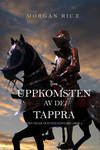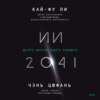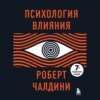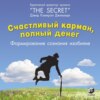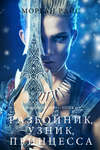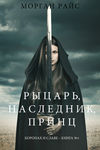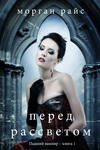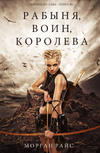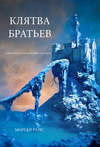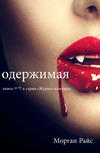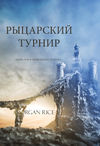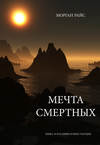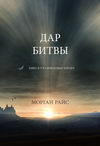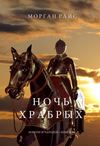Kitobni o'qish: «Uppkomsten Av De Tappra»
Morgan Rice
Morgan Rice är nummer #1 bästsäljande, och i USA Today är han den bästsäljande författaren av den episka fantasy-serien TROLLKARLENS RING, omfattar sjutton böcker; av # 1 bästsäljande serien EN VAMPYRS DAGBOK, bestående av elva böcker, av # 1 bästsäljande serie ÖVERLEVNADSTRILOGIN, en post-apokalyptisk thriller bestående av två böcker; och de nya episka fantasy-serien KONUNGAR OCH HÄXMÄSTARE, innefattar två böcker. Morgans böcker finns tillgängliga i ljudböcker och tryckta utgåvor, och finns översatt i 25 språk.
OMVÄND (Bok #1 En vampyrs dagbok), ARENA ETT (Bok #1 av Överlevnadstrilogin) och HJÄLTARS VÄG (Bok #1 Trollkarlens ring) DRAKARNAS GRYNING (Konungar Och Häxmästare – Bok #1) är alla tillgängliga att ladda ner gratis!
Morgan älskar att höra vad ni tycker, så besök www.morganricebooks.com för att gå med i mejllistan, få en gratis e-bok, få gratis gåvor, ladda ner gratis-appen, skaffa de senaste exklusiva nyheterna, anslut på Facebook och Twitter, och håll kontakten!
Sagt om Morgan Rice
“Om du trodde att där inte fanns någon anledning kvar till att leva efter slutet av TROLLKARLENS RING serierna, så har du fel. I DRAKARS GRYNING har Morgan Rice lovat en annan briljant serie, som fördjupar oss i en fantasi av troll och drakar, av tapperhet, ära, mod, magi och hopp om ditt öde. Morgan har lyckats att producera en stark samling av karaktärer som får oss att heja för deras framgång på varje sida…Rekommenderas för det permanenta biblioteket för alla läsare som älskar fantasy.”
– Books and Movie ReviewsRoberto Mattos
“DRAKARS GRYNING har lyckas – redan från början… En överlägsen fantasy…Det börjar med, precis som det borde, med huvudpersonens kamper och flyttar försiktigt in i en vidare krets av riddare, drakar, magi och monster, och öde…Alla de yttre tecknen på hög fantasi finns här, från soldater och strider till konfrontationer med sig själv…En rekommenderad vinnare för de som njuter av episk fantasy driven av kraftfulla, trovärdiga unga vuxna huvudpersoner.”
– Midwest Book ReviewD. Donovan, e-Bok Recensent
“[DRAKARS GRYNING] är en drivande novell med intriger som är lätt att läsa ut över helgen…En bra start till en lovande serie.”
– San Francisco Bokrecensent
“En action-packad fantasy som garanterat kommer falla de i smaken som tycker om Morgan Rices tidigare noveller, tillsammans med fans av THE INHERITANCE CYCLE av Christopher Paolini… Fans som tycker om ungdoms-fiction kommer att sluka den senaste novellen av Rice och be efter mer.”
— The Wanderer, A Literary Journal (angående Rise of the Dragons)
“En själfull fantasy som väver in element av mysterium och intriger i en röd tråd. A Quest of Heroes handlar om mod och om att inse att livet har mening som leder till utveckling, mognad, och överlägsenhet…För de som söker kraftiga fantasy äventyr, protagonister och åtgärder ger som en kraftfull uppsättning av möten som fokuserar väl på Tors utveckling från ett drömmande barn till en ung vuxen som har omöjliga odds för överlevnad … .Det är endast början av vad som ser ut att vara en episk ungdomsserie. "
– Midwest Book Review (D. Donovan, e-Bok Recensent)
“THE SORCERER’S RING har alla ingredienser för en lyckad bok: intriger, motintriger, mysterier, tappra riddare och spirande förälskelser, brustna hjärtan och svek. Det här är många timmars underhållning, och något för alla åldrar. Ett måste i varje fantasyläsares bokhylla.”
– Books and Movie Reviews, Roberto Mattos
“Rices underhållande episka fantasy [TROLLKARLENS RING] har klassiska drag av genren – en stark miljö, highly inspirerar av gamla Skottland och dess historia, och det ger en bra känsla för intriger.”
– Kirkus Reviews
“Jag älskar hur Morgan Rice byggde upp Thors karaktär och världen han levde i. Landskapet och varelserna som vandrade där var välbeskrivna…Jag tyckte om [intrigen]. Den var kort och ljuv…Det var den rätta mängden av mindre karaktärer, så man blev inte förvirrad. Där var äventyr och hemska stunder, men den actions om skedde var inte överdrivet grotesk. Boken är perfect för en ungdomlig läsare… Detta är är början på något anmärkningsvärt…”
– San Francisco Book Review
“I denna action-packade första boken i den episka fantasy-serien av Trollkarlens ring (som för nuvarande består av 14 böcker), Rice introducerar sina läsare till den 14 år gamla Thorgrin "Thor" McLeod, vars dröm är att gå med i Silvergardet, elitknektarna som tjänar kungen… Rices skrivning är kompakt och lovar spännande förutsättningar.”
– Publishers Weekly
“[HJÄLTARS VÄG] är snabb och enkel att läsa. Slutet på varje kapitel gör så att du måste läsa vad som händer sedan och du vill inte lägga ifrån dig boken. Där är några stavfel i boken, och några namn är hopblandade, men det distraherar inte dig från självaste storyn. Slutet på boken gjorde så att jag ville köpa nästa direkt och det är precis vad jag gjorde. Alla nio böcker från Trollkarlens ring kan köpas på Kindle, och Hjältars väg är just nu gratis för dig att börja läsa! Om du letar efter något snabbt och roligt att läsa medans du är på semester, är denna boken perfekt.”
– FantasyOnline.net
Böcker av Morgan Rice
KONUNGAR OCH HÄXMÄSTARE
DRAKARNAS GRYNING (Book #1)
DE TAPPRAS UPPKOMST (Book #2)
TROLLKARLENS RING
HJÄLTARS VÄG (Book #1)
KONUNGARS MARSCH (Book #2)
DRAKARS ÖDE (Book 3)
EN KAMP OM ÄRA (Book #4)
ÄRANS LÖFTE (Book #5)
ETT TAPPERT ANFALL(Book #6)
SVÄRDSRITEN (Book #7)
VAPENGÅVAN(Book #8)
BESVÄRJELSERNAS HIMMEL (Book #9)
ETT HAV AV SKÖLDAR(Book #10)
STÅLFURSTEN(Book #11)
ELDENS RIKE(Book #12)
DROTTNINGARS VÄLDE(Book #13)
BRODERSEDEN (Book #14)
DÖDLIGAS DRÖM (Book #15)
RIDDARES DUST (Book #16)
STRIDENS GÅVA (Book #17)
ÖVERLEVNADSTRILOGIN
ARENA ETT: SLAVJÄGARNA(Book #1)
ARENA TVÅ(Book #2)
THE VAMPIRE JOURNALS / EN VAMPYRS DAGBOK
OMVÄND(Book #1)
ÄLSKAD(Book #2)
FÖRRÅD(Book #3)
ÄMNAD (Book #4)
ÅTRÅDD(Book #5)
TROLOVAD(Book #6)
VIGD(Book #7)
FUNNEN(Book #8)
ÅTERUPPSTÅNDEN(Book #9)
BEGÄRD(Book #10)
DÖMD(Book #11)


Lyssna på KUNGAR OCH HÄXMÄSTARE i ljudboks-varianten!
Vill du ha gratis böcker?
Prenumerera på Morgan Rices mejllista och få 4 gratis böcker, 2 gratis kartor, 1 gratis app och exklusiva gratisgåvor! För att prenumerera, besök: www.morganricebooks.com
Copyright © 2015 av Morgan Rice
Alla rättigheter reserverade. Förutom vad som tillåts av U.S. Copyright Act från 1976, inga delar av denna publicering får reproduceras, distribueras eller överföras i någon form eller på något sätt, eller lagras i en databas eller söksystem, utan tillstånd av författaren.
Denna e-bok är licensierad för din personliga underhållning endast. Denna e-bok får inte återförsäljas eller ges bort till någon annan. Om du vill dela denna bok med en annan person, var vänlig köp en ytterligare kopia per mottagare. Om du läser denna boken utan att ha köpt den, eller om den endast inte köptes för dig, var då vänlig och återlämna den och köp en egen kopia. Tack för att du respekterar det hårda arbetet från denna författaren.
Detta är ett skönlitterärt verk. Namn, karaktärer, företag, organisationer, platser, evenemang, och händelser är antingen från författarens fantasi eller används litterärt. Någon likhet till verkliga personer, levande eller döda, är bara slumpartat.
Jacket image Copyright St. Nick, använd under licens från Shutterstock.com.

“Fega dör många gånger före deras död;
De tappra känner bara smaken av döden en gång.”
– William Shakespeare
Julius Caesar
KAPITEL ETT
Kyra gick sakta genom massakern, snön knastrade under hennes skor, som tog in förödelsen som draken hade lämnat efter sig. Hon var helt stum. Tusentals av kungens män, de flesta fruktade från Escalon, låg döda framför henne, utplånade på direkten. Förkolnade kroppar låg rykande runt om henne, snön smälte under dem, deras ansiktskonturer visade smärta. Skelett, som låg vridna i onaturliga positioner, greppade fortfarande sina vapen med sina beniga fingrar. Få lik stod fortfarande upp, deras kroppar var fortfarande vertikala, som om de kollade upp mot himlen för att se vad det var som dödade dem.
Kyra stannade bredvid en, kollade på det med förundran. Hon sträckte på sig och tog på det, hennes fingrar smekte bröstkorgen, och hon kollade med förundran på när det smulades ihop, rasslade ner i marken i en hög av ben, svärdet föll harmlöst vid dess sida.
Kyra hörde ett gällt skrik ovanför henne och böjde på nacken för att se Theos, cirkulerande högt ovan, som andades flammor som om han fortfarande inte var nöjd. Hon kunde känna vad han kände, känna ilskan bränna i ådrorna, hans lust att förstöra hela Pandesia – ja, till och med hela världen – om han kunde. Det var en djurisk ilska, en ilska som inte visste några gränser.
Ljudet av kängor i snön tog henne tillbaka, och Kyra kollade bakåt för att se sin fars män, ett dussin av de, gå igenom, tog in förstörelsen med chockade ögon. Dessa krigshärdade män hade tydligen aldrig sett en syn lik denna; till och med hennes far, som stod bredvid, tillsammans med Anvin, Arthfael och Vidar, såg chockad ut. Det var som att gå genom en dröm.
Kyra märkte hur dessa tappra krigare gick från att söka i skyarna, till att kolla på henne, de hade en känsla av förundran i deras ögon. Det var som att det var hon som hade gjort allt, som om det var hon som var draken. Hon hade ju trots allt lyckats sammankalla den. Hon kollade bort, kände sig obekväm; hon kunde inte se om de kollade på henne som om hon vore en krigare eller ett freak. Kanske visste de inte själva.
Kyra tänkte tillbaka på hennes bön på Vintermånen, hennes önskan om att få veta om hon var speciell, om hennes krafter var riktiga. Efter idag, efter denna striden, kunde hon inte tveka längre. Hon hade velat att draken skulle komma. Hon kände det själv. Hur visste hon inte. Men nu visste hon, definitivt, att hon var annorlunda. Och hon kunde inte hjälpa att undra om det också betydde att andra profetior om henne också var sanna. Var det hennes öde att bli en stor krigare? En grym härskare? Även större än hennes far? Skulle hon leda stora nationer in i krig? Skulle Escalons öde ligga på hennes axlar?
Kyra kunde inte se hur detta skulle kunna vara möjligt. Kanske hade Theos kommit på grund av sina egna anledningar; kanske hans förstörelse här inte hade med henne att göra. Trots allt hade ju Pandesianerna skadat honom – visst hade de?
Kyra var inte längre säker på någonting. Allt hon visste var att i den stunden, kände hon drakens styrka brinna i hennes ådror, och när hon gick genom slagfältet, och såg att deras största fiende var död, så kände hon att allt detta var möjligt. Hon visste att hon inte längre var en femton-årig tjej som hoppades på att bli godkänd i andra mäns ögon; hon var inte längre en leksak för Lord Governor – eller för någon annan man – att göra som han ville med; hon var inte längre en egendom för andra män, att giftas med, misshandlas av, torteras. Hon var nu sin egen person. En krigare runt om alla män – och en som skulle fruktas.
Kyra gick genom havet av kropper tills kropparna äntligen tog slut och landskapet gick över till is och snö igen. Hon tog en paus bredvid sin far, tog in utsikten av dalen som spred ut sig framför dem. Där låg de vidöppna portarna in till Argos, en tömd stad, allla dess män döda på dessa kullar. Det var kusligt att se ett så stort fort vara ledigt, obevakat. Pandesias viktigaste fort var nu vidöppet för vem som helst att gå in i. Dess skrämmande höga murar, gjorda på tjocka stenar och spikar, de tusentals män och lager av försvar, hade uteslutit alla idéer för en revolt; dess närvaro har gett Pandesia ett järngrepp på hela nordöstra Escalon.
Alla börjar gå ner för backen mot den slingriga vägen som leder mot stadens portar. Det var en segrande promenad, men samtidigt högtidlig, vägen kantades med ännu fler döda kroppar, släntrare som draken hade sorterat ut, små markörer på vägen till förstörelse. Det var som att gå genom en kyrkogård.
När de passerade de fantastiska portarna, stannade Kyra vid tröskeln, hon tappade nästan andan: på insidan kunde hon se, tusentals mer lik, förkolnande och rykande. Det var de som återstod av kungens män, de som inte hann röra på sig. Theos hade inte glömt någon; hans ilska var synlig även på muren, stora delar av stenen var brända efter .
När de gick in, märkte det hur tyst Argos var. Dess gårdsplan var tom, det var kusligt, precis som om det var en stad som saknade liv. Det var som om gud sög upp allt med ett enda andetag.
När hennes fars män rusade framåt, började ljud av spänning att fylla luften, och Kyra förstod snart varför. Hon kunde se att marken framför, var fylld som en skattkista med vapen av aldrig dess like. Där, utspridda på gårdsplanen, låg resterna efter ett krig: de finaste vapen, det finaste stålet, det finaste pansar någon sett, allt glänste med Pandesians stadssköld på. Där fanns till och med säckar med guld, utspritt bland det andra.
Men vad som var ännu bättre var att vid slutet av gårdsplanen så var där ett stort vapenförråd i sten, dess dörrar var öppna som om de män som var där, lämnade i all hast, och avslöjade insidan full med skatter. Väggarna var fyllda med svärd, hillebards, hackor, spjut och pilbågar – allt gjort av det finaste stålet som fanns att erbjuda i denna värld. Det var tillräckligt med vapen här för att beväpna hela Escalon.
Det kom ett gnäggande ljud, och Kyra kollade mot andra sidan av gårdsplanen för att se en rad med stall gjorda av sten, och inuti stod de finaste hästar och stampade, alla skonade från drakens andedräkt. Tillräckligt med hästar för att bära en hel armé.
Kyra hoppet tändas i hennes fars ögon, en syn hon inte sett på flera år, och hon visste vad han tänkte: Escalon kunde uppstå igen.
Det hördes ett skrik, och Kyra kollade upp för att se att Theos cirkulerade längre, med sina klor blottade, flaxande med sina stora vingar när han flög över staden, ett segrarvarv. Hans glödande gula ögon låste sig i hennes, till och med från det avståndet. Hon kunde inte kolla bort.
Theos dök neråt och landade utanför portarna. Han satt där stolt, mot henne, som om han kallade på henne. Hon kände att han kallade på henne.
Kyra fick gåshud, glöden steg med henne, när hon kände en intensiv kontakt med denna varelsen. Hon hade inget mer val än att närma sig honom.
När Kyra vände sig om och gick över gårdsplanen, tillbaka mot stadsportarna, så kände hon att ögonen från alla män, brände i nacken och blickarna skiftades mellan draken och henne, som om de slutade kolla. Hon gick ensam mot portarna, med sina kängor som knastrade i snön, och hennes hjärta som slog medans hon gick.
Medans hon gick, kände Kyra plötslig en varsam hand på hennes axel, som stannade henne. Hon vände sig om för att se sin fars oroande ansikte kolla på henne.
“Var försiktigt,” varnade han.
Kyra fortsatte att gå, utan att känna rädsla, trots den ilskna blicken i drakens ögon. Hon kände endast ett intensivt band mellan de två, som om en del av henne hade återkommit, en del hon inte kunde leva utan. Hennes tankar sprudlade med nyfikenhet. Var hade Theos kommit från? Varför hade han kommit till Escalon? Varför hade han inte kommit tillbaka tidigare?
När Kyra passerade genom Argo’s portar och närmade sig draken, växte hans nos sig större, ett ljud som var lite mellan ett spinnande och ett morrande ljud, som om han väntade på henne, hans kraftiga vingar rörde på sig. Han öppnade sin mun som om han skulle släppa ut sin eld, och visade sina gigantiska tänder, varje tand lika lång som henne själv, och vassa som svärd. Under en liten stund var hon rädd, hans ögon fixerades vid henne med en intensitet som gjorde det svårt att tänka.
Kyra stannade en liten bit framför honom. Hon studerade honom med fruktan. Theos var magnifik. Han var 9 meter hög, hans fjäll tjock, hård, urtida. Marken skakade när han andades, hans bröst skramlade, och hon kände hela hans nåd.
De stod där i tystnad, båda ansikte mot ansikte, och undersökta varandra. Kyra’s hjärta dunkade hårt i hennes bröst, spänningen i luften var så tjock så hon kunde knappt andas.
Med hennes torra halls, lyckades hon äntligen framkalla modet att börja prata.
“Vem är du?” frågade hon, med en röst som inte var högre än en viskning. “Varför har du kommit till mig? Vad vill du ha av mig?”
Theos sänkte sitt huvud, morrade, och lutade sig framåt, så nära att hans stora nos nästan nuddade hennes bröst. Hans ögon, så stora, glödande gula, verkade kolla rakt igenom henne. Hon stirrade in i dem, nästan lika stora som henne, och hon kände sig vilsen i en annan värld, i en annan tid.
Kyra väntade på svaret. Hon väntade på att hon skulle fyllas med hans tankar, som det en gång var.
Hon väntade och väntade, och var chockad när hon märkte att där var helt tomt. Inget kom till henne. Hade Theos blivit stum? Hade hon förlorat sin kontakt till honom?
Kyra stirrade tillbaka och undrade, denna draken är mer än ett mysterium än tidigare. Plötsligt sänkte han sin rygg, som ett tecken att hon ska rida honom. Hennes hjärta slog snabbare när hon föreställde sig flyga genom skyarna på hans rygg.
Kyra gick sakta fram till hans sida, sträckte sig, och tog tag i hans fjäll, hård och grov, och förberedde sig att ta tag i hans nacke och dra sig upp.
Men precis när hon hade rört honom, vred han sig bort från henne, och fick henne att förlora sitt grepp. Hon snubblade och han började flaxa sina vingar och i en snabb rörelse, lyfta han, så snabbt att hennes handflator skrapades mot hans fjäll, som sandpapper.
Kyra stod stilla, stum och chockad – men mest av allt, förkrossad. Hon kollade hjälplöst på när den kolossala varelsen flög genom luften, skrikande, och flög högre och högre. Så snabbt som han hade kommit, var Theos försvunnen i molnen igen, med inget annat än tystnad efter sig.
Kyra stod där, helt urholkad, mer ensam än någonsin. Och när de sista skriken försvann, visste hon, hon bara visste, att Theos var borta för gott.
KAPITEL TVÅ
Alec sprang genom skogen i nattens mörker, med Marco vid sin sida, snubblande över rötter som låg gömda i snön och undrande ifall de kommer kunna ta sig därifrån levande. Hans hjärta slog i hans bröst när han sprang för sitt liv, kippande efter andan, han ville stanna men behövde hålla samma takt som Marco. Han kollade bakom sin axel för den hundrade gången och såg glöden från Flammorna bli svagare desto djupare in i skogen de kom. Han passerade ett stycke av täta träd, och snart var glöden helt borta, de försvann i nästan komplett mörker.
Alec vände och vred, grenarna sträckte sig och slet i hans armar. Han försökte se in i mörkret framför honom, och försökte se en väg han kunde ta, försökte att inte lyssna på alla exotiska ljuden runt om honom. Han hade blivit ordentligt varnad om dessa skogarna, där inga som hade flytt överlevde, och han hade en sjunkande känsla desto djupare in de gick. Han kände farorna, onda varelser som lurar överallt, skogen var så tät så det var svårt att hitta och man fastnade desto fler steg man tog. Han började undra om det inte var bättra att stanna med Flammorna.
“Denna vägen!” väste en röst.
Marco tog tag i hans axel medans han svängde höger, mellan två gigantiska träd, och duckade under de knotiga trädgrenarna. Alec följde efter, halkande i snön, och såg hur dimman i den täta skogen började att klarnas upp, månljuset sken igenom och visade deras väg.
De båda stannade, böjde sig ner, med händerna på höfterna, och kippade efter andan. De utbytte en snabb blick, och Alec kollade bakom sin axel igen mot skogen. Han andades tungt, hans lungor värkte från kylan, hans revben gjorde ont, och han undrade.
“Varför följer de inte efter oss?” frågade Alec.
Marco skakade på sina axlar.
“Kanske visste de att skogen skulle göra jobbet åt dem.”
Alec lyssnade efter ljudet av Pandesians soldater, väntade sig att de skulle jaga efter dem – men där kom inga. Istället, trodde Alec att han hörde ett annat ljud – typ som ett lågt, argt morrande.
“Hörde du det där?” frågade Alec, samtidigt som håret i nacken reste sig.
Marco skakade på huvudet.
Alec stod där, och väntade, undrade om hans hjärna spelade honom ett spel. Sedan, hörde han det igen. Det var ett avlägset ljud, ett svagt brummande, det lät hotfullt, olikt något annat som Alec någonsin hade hört. Medans han lyssnade, började ljudet att låta högre, som om det kom närmre.
Marco kollade nu på han med oro.
“Det var därför de inte följde efter,” sa Marco, med en skakig röst.
Alec var förvirrad.
“Vad menar du?” frågade han.
“Wilvox,” svarade han, med ögon fyllda av rädsla. “De har släppt dem för att jaga oss.”
Ordet Wilvox skapade terror inuti Alec; han hade hört talas om de som barn, och han visste att ryktet sa att de bodde i Törnarnas skog, men han hade alltid antagit att det var en legend. Myten säger att de var de dödligaste varelserna av alla nattens djur – som gjord för mardrömmar.
Brummandets ljud ökade, och det lät som om det var flera stycken.
“SPRING!” skrek Marco.
Marco vände och Alec också när de två rusade tillbaka in i skogen igen. Adrenalinet pumpade in i ådrorna när Alec sprang, och han hörde sitt eget hjärtslag i bröstet, ljudet av snön och isen som krossades under hans kängor dränkte allt annat ljud. Snart, dock, hörde han ljudet av varelserna som närmade sig, och han visste att de var jagade av bestar som de inte kunde springa ifrån.
Alec snubblade över en rött och föll rätt in i et träd; han skrek av smärta, tappade luften, och sen fortsatte han att springa. Han sökte i skogen efter någonstans att fly, och insåg att de hade ont om tid – men där fanns ingenstans att ta vägen.
Medans han sprang blev det brummande ljudet ännu högre, Alec kollade över sin axel igen – och han önskade genast att han inte hade det. I full fart mot dem sprang fyra av de mest vildsinta varelser han någonsin sentt. Vargliknande, men Wilvoxarna var dubbelt så stora, med smala vassa horn som stack upp på baksidan av huvudet, och ett stort, rött öga mellan hornen. Deras tassar var lika stora som en björns, med långa, vassa klor, och deras pälsar var som polerade och svarta som natten.
När han såg varelserna på så nära håll, så visste Alec att han var en död man.
Alec rusade fram med sina sista krafter, han svettades om sina handflator trots kylan, hans andedräkt frös i kylan före honom. Wilvoxarna var knappast fem meter bort och han visste från deras desperata blick, från dräglet som hängde från deras munnar, att de kommer slita honom i bitar. Han såg ingen mening med att fly. Han kollade på Marco, hoppades på någon slags plan – men Marco hade samma förtvivlan i sin blick. Han hade tydligen inte heller någon idé.
Alec stängde sina ögon och gjorde något han aldrig gjort förut: han bad en bön. Han såg sitt liv passera i revy framför hans ögon, på något sätt förändrade det honom, fick honom att inse hur mycket han värdesatte sitt liv, och det gjorde honom mer desperat än vad han någonsin varit för att få behålla det.
Snälla Gud, ta mig ut ur detta. Efter vad jag gjorde för min bror, låt mig inte dö här. Inte på detta stället, och inte av dessa varelserna. Jag gör vad som helst.
Alec öppnade sina ögon, kollade framför sig, och precis när han gjorde det, såg han ett träd som skiljde sig svagt från alla andra. Dess grenar var mer krokiga, och hände närmare marken, precis lagom högt så att kan kunde få tag i en gren om han hoppade. Han hade ingen idé om Wilvoxarna kunde klättra, men han hade inget annat val.
“Den grenen!” skrek Alec till Marco, samtidigt som han pekade.
De sprang mot trädet tillsammans, och Wilvoxarna närmade sig, med någon meter kvar, utan paus, hoppade de och tog tag i grenen, och drog upp sig själva.
Alecs hand halkade på den hala grenen, men han klarade av att hänga sig kvar, och han drog sig själv upp och tog tag i nästa gren som hängde någon meter över marken. Han hoppade omedelbart upp på nästa gren, 1 meter högre, med Marco bredvid honom. Han hade aldrig klättrat så snabbt i hela sitt liv.
Wilvoxarna kom fram, flocken morrade argsint, hoppade och klöste deras fötter. Alec kände deras varma andedräkt mot baksidan av hans häl stunden innan han drog upp sin fot, huggtänderna missade honom med bara några centimeter. De fortsatte att klättra, fyllda med adrenalin, tills de var nästan fem meter från marken, och säkrare än vad de behövde bara.
Alec stannade, höll sig fast i grenen med all sin kraft, försökte komma ikapp med andningen, medans svetten stack i hans ögon. Han kollade ner, hoppades att Wilvoxarna de inte kunde klättra.
Till hans starka lättnad, var de fortfarande nere på marken, morrande och huggande, hoppandes upp mot trädet, men de kunde inte klättra. De klöste argsint på trädet, men det tjänade inget till.
De satt kvar på grenen, och medans verkligheten sjönk in, att de var säkra, suckade de båda av lättnad. Marco började skratta, till Alecs förvåning. Det var en galnings skratt, ett skratt av lättnad, skrattet av en man som hade klarat sig undan från döden på det mest osannolika sättet.
När Alec insåg hur nära de hade varit, kunde han inte låta bli att skratta han också. Han visste att de fortfarande var långt ifrån säkra; han visste att det inte kunde lämna detta trädet och att de antagligen skulle dö här. Men just nu var de i alla fall säkra.
“Ser ut som att jag är skyldig dig en tjänst” sa Marco.
Alec skakade på sitt huvud.
“Tacka mig inte än,” sa Alec.
Wilvoxarna morrade argsint, reste ragg, och Alec kollade upp för trädet, med skakande händer, och ville ta sig ännu längre ifrån, och han undrade hur högt de kunde klättra, och om de någonsin skulle kunna ta sig härifrån.
Plötsligt stelnade Alec till. När han kollade upp, ryggade han tillbaka, slagen av en rädsla han aldrig haft innan. Grenarna ovan honom, som såg ner, var den mest otäcka varelsen han någonsin sett 2.5 meter hög, med en kropp som liknade en orm, fast med 6 ben, alla utrustade med långa klor, och ett huvud format som en ål, den hade smala springor som ögon, svagt gula, och de var fokuserade på Alec. Bara en meter ifrån, reste den sig, väste, och öppnade sin mun. Alec, som var i chock, kunde inte tro hur stort gap den hade – stort nog för att svälja honom hel. Och han visste, från dess skakande svans, att den skulle attackera – och döda båda två.
Dess mun flög rätt mot Alecs hals, och han reagerade ofrivilligt. Han skrek och hoppade bakåt samtidigt som han förlorade greppet, med Marco bredvid honom, tänkande att han bara behövde undkomma de dödliga huggtänderna, det stora gapet, och en säker död.
Han tänkte inte alls på vad som var under honom. När han flög bakåt i luften, mot marken, fäktandes med armarna, insåg han alldeles för sent, att han flög från ett par huggtänder till ett annat. Han kollade bak och såg Wilvoxarna dregla, öppna sina käftar, och det fanns inget han kunde göra förutom att acceptera sitt fall.
Han hade bytt ut en död för en annan.
